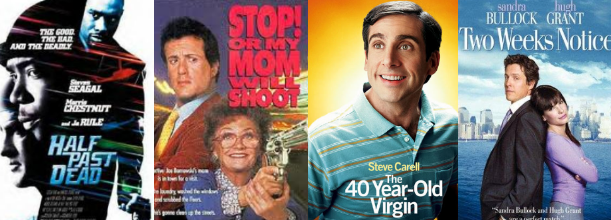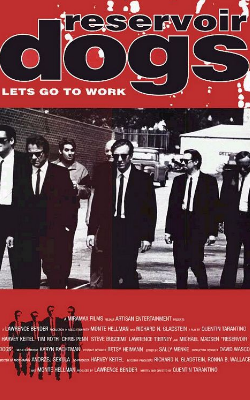Top 10 awful things film posters do to the English language

Punctuation, eh? Why bother with it? Surely, much like over-ladening a glossy racing seal with garish costume jewellery, all punctuation really does is slow things down, leaving your central point gasping for air and covered in wet bits of glitter. In this day and age, why do we need such hefty word accessories? Because we just definitely do. Like beautiful road signs on your sentence journey, correct grammar and punctuation make the wonderful world of words make sense. But film posters, it seems, are determined to destroy the happy light it brings to our lives. We map out the top 10 linguistic crimes film posters can (and do) make. The madness has to stop somewhere.
#10. Obliterating the humble apostrophe
“Let’s” and “Weeks’ “, people. Why banish the apostrophe from these halls? Why?
Now, if we were trying to be kind (not a practice encouraged at BFF), we could at least say that “Two Weeks’ Notice” is a slightly tricky apostrophe to work out. As the “weeks” in question don’t technically have obvious ownership over the “notice”, it could be argued that they don’t conform to the plural possessive rule. Thus, “Two Weeks” is actually, technically correct. Sadly though, this is utter rubbish. Just as you’d write “One week’s notice” (one week’s worth of notice), using the singular possessive, so you use the plural possessive when the weeks are bumped up to two. “Two Weeks’ Notice”. And to be honest, there’s just no excuse for Reservoir Dogs. “Lets”? “LETS”?!
#9 Going mental with dashes
I think we can all agree that currently, this title makes no sense. The 40 (forty, remember count them) Year-Old Virgin. Wait. How can you start with many (40) and end with one (Virgin)? The 40 Year-Old Virgin is nonsense. The only way the title can make sense as it stands is if you make the virgins plural, and by gum does that make it rather a different film – The Forty Year-Old Virgins. Ah. What they actually meant, I believe, is The 40-Year-Old Virgin. That’s better, isn’t it? And no-one had to talk about one year old virgins.
#8. Nuking question marks
…if it’s a question or not? I genuinely don’t know.
7. Abusing the exclamation mark
Just to confirm, that’s “A new – and altogether different – screen excitement!!!”
Perhaps team Psycho thought that bombarding their tag-line with exclamation marks would make the entire production more exciting. Perhaps they thought that by providing a dusty impact cloud of punctuation the horrible phrase “screen excitement” would be somehow obscured. Perhaps they thought the film wouldn’t stand the test of time, and so none of it bloody mattered anyway. Wrong.
#6. Believing punctuation demonstrates how to say things, and little else
Just look at it. Look at it. God it’s horrible. Just to clarify, this film believes that “Or my mom will shoot” is a sentence. What a world this is. Shoot me, Sylvester Stallone’s Mum, please just put us all out of our misery.
#5. Thinking ellipses are basically word buffers
As with Stop! Or My Mom Will Shoot, this essentially comes back to treating punctuation like speech-direction. When you have to say it out loud in order for it to make sense, it probably doesn’t actually make any sense. Poor ellipses. Look at them, they’re knackered.
#4. Using puns that break if you write them down
Only works if you say it, doesn’t it, Ghost Ship? (and even then it’s still crap)
#3.Mistaking nonsense for intrigue
For God’s sake.
#2. They just don’t even try
“Screenplay and directed by”? “SCREENPLAY AND DIRECTED BY”, Sean Penn?!
#1. Just, just hurting the precious words
Technically, there’s nothing wrong with it. And yet, everything is wrong. Everything is wrong now.
















Recent Comments